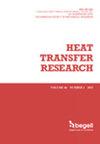Machine learning-based predictions of nanofluid thermal properties
IF 1.6
4区 工程技术
Q3 THERMODYNAMICS
引用次数: 0
Abstract
In this study, machine learning-based predictions of thermal conductivity, dynamic viscosity, and specific heat of nanofluids are explored. Various types of nanofluids and parametric conditions are considered to broaden and evaluate the effectiveness of popular machine learning models, including multilayer perceptron, random forest, light gradient boosting machine, extreme gradient boosting and stacking algorithms. The performance of these prediction models is assessed using mean squared error and coefficient of determination. The influence of each input variable on model development was examined to identify key features. Information gain is introduced and calculated for determining the importance of parameters in prediction. External validation is performed with an additional unseen dataset to further assess the applicability of the selected models across different experimental data points. It was found that the stacking technique is the most accurate machine learning algorithm among those investigated. The results demonstrate that machine learning methods can provide excellent predictions of the thermophysical properties of complex nanofluids.基于机器学习的纳米流体热特性预测
本研究探讨了基于机器学习的纳米流体热导率、动态粘度和比热预测。考虑了各种类型的纳米流体和参数条件,以拓宽和评估流行的机器学习模型的有效性,包括多层感知器、随机森林、轻梯度提升机、极端梯度提升和堆叠算法。这些预测模型的性能使用均方误差和决定系数进行评估。研究了每个输入变量对模型开发的影响,以确定关键特征。引入并计算了信息增益,以确定参数在预测中的重要性。使用额外的未见数据集进行外部验证,以进一步评估所选模型在不同实验数据点上的适用性。结果发现,堆叠技术是所研究的机器学习算法中最准确的一种。结果表明,机器学习方法可以对复杂纳米流体的热物理性质进行出色的预测。
本文章由计算机程序翻译,如有差异,请以英文原文为准。
求助全文
约1分钟内获得全文
求助全文
来源期刊

Heat Transfer Research
工程技术-热力学
CiteScore
3.10
自引率
23.50%
发文量
102
审稿时长
13.2 months
期刊介绍:
Heat Transfer Research (ISSN1064-2285) presents archived theoretical, applied, and experimental papers selected globally. Selected papers from technical conference proceedings and academic laboratory reports are also published. Papers are selected and reviewed by a group of expert associate editors, guided by a distinguished advisory board, and represent the best of current work in the field. Heat Transfer Research is published under an exclusive license to Begell House, Inc., in full compliance with the International Copyright Convention. Subjects covered in Heat Transfer Research encompass the entire field of heat transfer and relevant areas of fluid dynamics, including conduction, convection and radiation, phase change phenomena including boiling and solidification, heat exchanger design and testing, heat transfer in nuclear reactors, mass transfer, geothermal heat recovery, multi-scale heat transfer, heat and mass transfer in alternative energy systems, and thermophysical properties of materials.
 求助内容:
求助内容: 应助结果提醒方式:
应助结果提醒方式:


